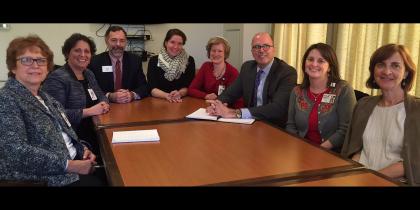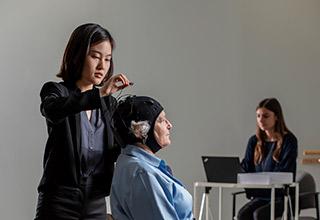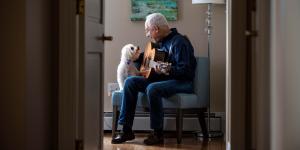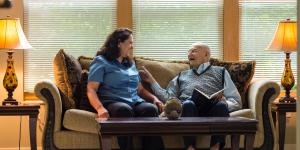Blazing a Trail for Improved Care of LGBT Seniors

At Hebrew Rehabilitation Center (HRC), an integral part of Hebrew SeniorLife, we provide high-quality, person-centered care that meets the special needs of our patients. Within our post-acute care services, our person-centered approach to care ensures patients and their families take an active role in their treatment and recovery. Our staff is committed to getting to know each patient and developing a one-on-one relationship that improves care and facilitates recovery. The same is true in our long-term chronic care programs where staff is implementing a culture that prioritizes patient choice. Simply stated, we’re putting the needs of our patients first and foremost in everything we do.
At Hebrew SeniorLife, we celebrate diversity and welcome people of all races, faiths, ethnic backgrounds and sexual orientations. To this end, HRC takes its commitment to the LGBT community very seriously. Working closely with the LGBT Aging Project, a non-profit organization dedicated to ensuring that lesbian, gay, bisexual and transgender older adults have equal access to the life-prolonging benefits, protections, services, and institutions that their heterosexual peers take for granted, HRC is well on its way to making LGBT seniors feel more welcome and comfortable.
“It has been wonderful to partner with the LGBT Aging Project and they have taught us a lot about how we can open our doors, provide training to our staff, and work to have an informed, welcoming, and inclusive community,” says Rabbi Sara Paasche-Orlow, Director of Spiritual Care, who has been leading this initiative. “HRC knows it is an important project to address, and we could not do it without the expertise, support, and partnership of the LGBT Aging Project.”
The first step in our commitment to serving the LGBT community was recognizing that administration and nursing leadership needed to be fully on board, and that we would need a plan for helping all front line staff become sensitive and knowledgeable about caring for LGBT elders. We also needed to review our Human Resources policies, marketing information, and admission materials to ensure we were letting LGBT staff, potential patients, and family members know that they are not invisible and that we are open to their full participation in our community. A team of diverse staff members, all of whom are leaders in creating a person-centered culture, have taken on these challenges and are involved in a series of awareness and sensitivity trainings.
In March, staff gathered in the synagogue at HRC for a daylong session and listened to a panel on the life experience of three LGBT guest presenters -- a nurse, a former banker, and a psychologist-lawyer -- which helped shed some light on the subject. All three presenters delivered personal accounts and helped HRC staff understand the complex issues faced by many LGBT seniors. The room was quiet for the duration of the presentations. Staff listened closely, taking in every word. The presenters agreed on one thing: there is much more work to do.
Engaging our staff in training sessions, and ongoing awareness building, will allow us to let LGBT seniors who need our services know that we care about their health and are able to provide all seniors with the best care.
Resounding applause filled the room as the speakers left the stage. “We are proud of our innovative work and strive to be the most LGBT-friendly place for seniors!” said Robin Stewart, Hebrew SeniorLife’s Senior Community Life Leader, who attended the workshop.
About Long-Term Chronic Care Programs at Hebrew Rehabilitation Center
Hebrew Rehabilitation Center is reinventing the long-term chronic care program so seniors can live their best lives. The basic tenet of care at Hebrew Rehabilitation Center is patient preferences come first. Our vision for long-term chronic care emphasizes the dignity, health, and independence of seniors. Our innovative programming—along with a dedicated staff of Harvard Medical School-affiliated physicians, geriatric specialists, nurses, and more—can be experienced in three communities in Massachusetts: Hebrew Rehabilitation Center Boston, Hebrew Rehabilitation Center Dedham at NewBridge on the Charles, and long-term care at Orchard Cove in Canton. We welcome older adults of all backgrounds, faiths and cultures.
Blog Topics
Learn More
Innovation at HSL
Whether we're making discoveries or developing new teaching methods, HSL continuously works to improve the lives of older adults.




